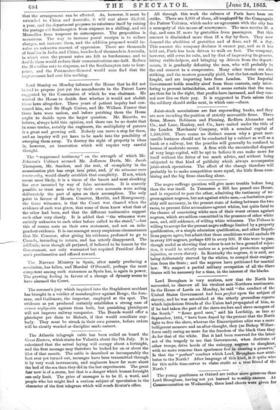The negro suffrage question will give more trouble before long
than the war itself. In Tennessee a Bill has passed one House, and is expected to pass the other, admitting the testimony of ne- groes against negroes, but not against white men,—a limitation pos- sibly still necessary, in the present state of feeling between the two races, to prevent false accusations against whites, but quite fatal to the chance of convicting white men of their worst crimes against negroes, which are seldom committed in the presence of other white men, and, still seldomer, of willing white witnesses. The Tribune is willing to accept for the present negro suffrage limited by a property qualification, or a simple education qualification, and other. Repub- lican papers agree, but admit that these conditions would exclude 99 in every 100 negroes, perhaps 499 in every 500. If this were to pass, though useful as showing that colour is not to be a ground of rejec- tion, it would be utterly useless as a practical protection against injustice, or even slavery. In Kentucky the negroes, it is said, are being deliberately starved by the whites, to compel their emigra- tion from- the State; and the negroes have petitioned for martial law. We suspect a partial military occupation of all the Slave States will be necessary for a time, in the interest of the blacks.






























 Previous page
Previous page